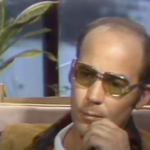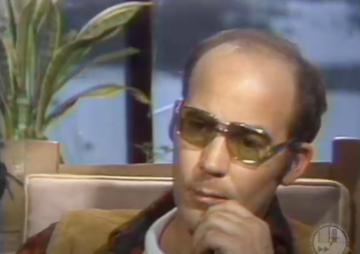

There’ve been any number of aspiring “gonzo journalists” over the past half-century, but there was only one Hunter S. Thompson. Having originated with his work in the early 1970s, this sense of gonzo made it into the Random House Dictionary within his lifetime. “Filled with bizarre or subjective ideas, commentary, or the like,” says its first definitions. And its second: “Crazy; eccentric.” Thompson seems to have approved, seeing as he kept a copy of this very edition, put on display at the Owl Farm Private Museum (run by the Gonzo Foundation) after his death in 2005. Thirty years earlier, he had the question put to him in the interview above: “What is gonzo journalism?”
“That word has really plagued me,” Thompson says. But he also credits it with putting distance between himself and the recently ascendant “New Journalists” like Tom Wolfe, Gay Talese, and Joan Didion: “I wasn’t sure I was doing that, but I was sure I wasn’t doing what we call straight journalism.” Indeed, few pieces could have seemed less “straight” than “The Kentucky Derby Is Decadent and Depraved,” first published in Scanlan’s Monthly in 1970. Assembled in desperation out of pages pulled straight from Thompson’s notebook and illustrated by Ralph Steadman (the beginning of a long and fruitful collaboration), the piece struck some readers as a revelation. A friend of Thompson’s declared it “pure gonzo” — an unconventional name for an unconventional form.
“Christ,” Thompson remembers thinking, “if I made a breakthrough, we’ve got to call it something.” Why not use a label with at least one instance of precedent? (It also appealed, he admits, to his inner “word freak.”) As for the substance of gonzo, he attributes to it “a mixture of humor and a high, stomping style, a bit more active than your normal journalism” — as well as whatever gets him past his innate hatred of writing. “All I can really get off on,” he says, is “when I can let my mind run. I start to laugh. I understand that Dickens used to laugh at his typewriter. I don’t laugh at my typewriter until I hit one of those what I consider pure gonzo breakthroughs. Then it’s worth it.”
Published three years earlier, Thompson’s best-known book Fear and Loathing in Las Vegas marked the culmination of a particular writing project: “to eliminate the steps, or the blocks, between the writer and the page. That’s why I always get the fastest and newest typewriter. If they make one that costs twelve million dollars, I’ll write a bad check and get it for a while.” Regulating this signature gonzo directness is a rigorous stylistic discipline. “That’s the one book of mine that I’ve even read,” Thompson says, thanks to the “four or five rewrites” he performed on the manuscript. “There’s not a word in there — I mean, there might be fifteen or twenty, but that’s about all — that don’t have to be there.”
Interviewing Thompson is veteran journalist Harrison Salisbury, the New York Times‘ Moscow bureau chief in the 1940s and 50s. He also wrote many books including The Shook-Up Generation, a 1958 study of juvenile delinquency (and a volume found in Marilyn Monroe’s personal library) that could have primed his interest in Thompson’s debut Hell’s Angels when it came out a decade later. Appear though he may to be the kind of establishment figure who’d have little enthusiasm for gonzo journalism, Salisbury’s questions suggest a thorough knowledge and understanding of Thompson’s work, right down to the “tension” that drives it. “It could be drug-induced, or adrenaline-induced, or time-induced,” Thompson says of that tension. “I’ve been told by at least one or two confident specialists that the kind of tension I maintain cannot be done for any length of time without… I’ll either melt or explode, one of the two.”
Related Content:
Read 9 Free Articles by Hunter S. Thompson That Span His Gonzo Journalist Career (1965-2005)
“Gonzo” Defined by Hunter S. Thompson’s Personal Copy of the Random House Dictionary
Hunter S. Thompson Talks with Keith Richards in a Very Memorable and Mumble-Filled Interview (1993)
A Young Hunter S. Thompson Appears on the Classic TV Game Show, To Tell the Truth (1967)
Based in Seoul, Colin Marshall writes and broadcasts on cities, language, and culture. His projects include the Substack newsletter Books on Cities, the book The Stateless City: a Walk through 21st-Century Los Angeles and the video series The City in Cinema. Follow him on Twitter at @colinmarshall or on Facebook.
Hunter Thompson Explains What Gonzo Journalism Is, and How He Writes It (1975) is a post from: Open Culture. Follow us on Facebook and Twitter, or get our Daily Email. And don't miss our big collections of Free Online Courses, Free Online Movies, Free eBooks, Free Audio Books, Free Foreign Language Lessons, and MOOCs.
from Open Culture https://ift.tt/3yDXKDk
via Ilumina

Comments
Post a Comment